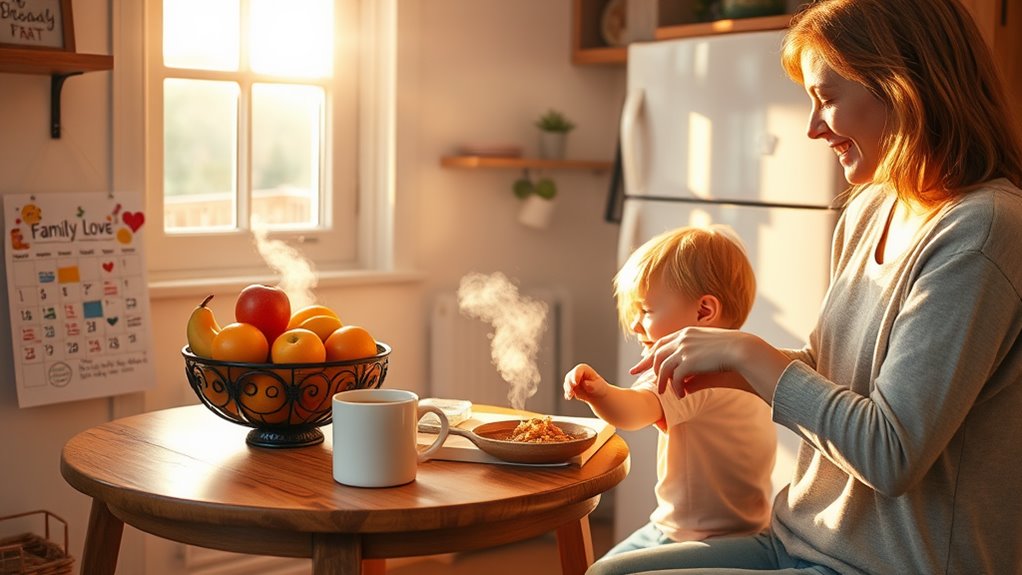Family routines are like the secret sauce for positive behavior in kids! When you stick to regular activities, like mealtime or homework time, it creates a sense of safety, which helps them feel more secure. These routines help kids learn responsibility and independence, so they can manage their own tasks without too much fuss. Plus, they reduce anxiety and meltdowns by providing structure. With shared moments and fun family traditions, everyone gets to bond and make memories. So, the next time you think about your daily schedule, remember it’s not just about keeping things orderly—it’s a great way to boost happy behavior and family connection! Want to know more about making it work?
Understanding Family Routines
Family routines play an essential role in shaping a child’s behavior and emotional well-being. When you think about it, routines are like the glue that holds everything together in your family. They give kids a sense of security, helping them know what to expect each day.
Whether it’s breakfast time, homework hour, or family game night, these consistent activities create a rhythm that your child can rely on.
Having a routine doesn’t mean you can’t have fun. It can actually make life more enjoyable! Imagine this: every evening, you gather around the dinner table. You share stories about your day, maybe even some silly jokes.
This not only strengthens your family bond but also helps your child feel valued and understood.
As you establish routines, you’re teaching your kids important life skills, like responsibility and time management. They learn how to balance their schoolwork with playtime, just like you juggle your daily tasks.
And who knows? Maybe they’ll even start to pick up some of your good habits. So, embrace those routines! They might just be the secret ingredient to nurturing positive behavior in your child.
Benefits of Structured Routines
How can structured routines positively impact your child’s development? Well, think of routines as the secret ingredient in your family recipe for happiness! When kids know what to expect each day, they feel more secure and confident. This sense of stability can reduce anxiety and help them tackle challenges with a brave face.
Structured routines also boost your child’s independence. By encouraging them to follow a daily plan—like brushing teeth or packing their backpack—you’re teaching valuable life skills. Soon enough, they’ll be taking charge of their own responsibilities, and you might just find yourself with a mini superhero at home!
Another fantastic benefit is improved behavior. Routines help kids channel their energy in positive ways. Instead of bouncing off the walls, they’ll have specific times for homework, play, and chores.
Plus, when they develop good habits, you’ll notice fewer meltdowns over time—talk about a win-win!
Lastly, shared routines can strengthen family bonds. Whether it’s a weekly game night or a bedtime story, these moments create lasting memories.
Developing Consistent Schedules
Establishing consistent schedules can be a game changer for your child’s daily life. When you create a routine, your child knows what to expect and can feel more secure.
Think about it: if breakfast happens at the same time every day, they won’t have to guess when it’s time to eat. This helps them focus on getting ready and not just wondering when their tummy will get filled!
You might want to start by setting a regular time for waking up, meals, and even homework. Keep it simple and adjust it to fit your family’s needs. Kids thrive on predictability, and a consistent schedule can help reduce anxiety about what comes next.
Plus, it frees up time for fun activities, like family game nights or movie marathons.
Don’t forget to include some flexibility! Life can throw curveballs, and it’s okay to adjust the schedule when needed. Just remember, the key is to keep the routine consistent enough that your child can rely on it.
Routines and Emotional Stability
When your child feels secure in their daily routines, it can greatly boost their emotional stability. Think about it: kids thrive on predictability. When they know what to expect, they feel safe and less anxious. Whether it’s a morning routine that includes breakfast and brushing teeth or a bedtime ritual with story time, these consistent activities help them understand their world better.
Routines create a sense of belonging, too. When you sit down for dinner as a family or have a weekend game night, your child knows they’re part of something special. This connection builds their self-esteem and helps them manage their feelings. Plus, it’s a great way to bond—who doesn’t love a little family fun?
Of course, life happens, and sometimes routines get disrupted. That’s okay! Just reassure your child that it’s part of life. You can even create a “backup plan” together for those unexpected moments. This way, they’ll feel equipped to handle changes.
Impact on Child Behavior
A well-structured daily routine can transform your child’s behavior in remarkable ways. When you set clear expectations, your child knows what to expect, which helps reduce anxiety. Think about it—if they know it’s time for homework right after dinner, they’re more likely to buckle down and focus. It’s like having a roadmap for the day!
Kids thrive on consistency. When they see you stick to routines, they learn reliability, which can help them develop self-discipline. You’ll notice they might even start taking responsibility for their tasks, like packing their school bags or setting the table.
And who doesn’t love a little less chaos at home? Plus, routines can boost your child’s mood. When they know what comes next, they feel secure, which makes them happier. Sure, there might be some grumbling about bedtime, but it’s all part of the package!
Creating a Positive Home Environment
Creating a positive home environment starts with building on those routines that foster security and reliability. When you establish regular activities, like a set bedtime or a weekend game night, everyone knows what to expect. This predictability helps kids feel safe, which is super important for their happiness.
You can also make your home a cheerful place by adding personal touches. Hang up family photos, create a cozy reading corner, or even decorate a shared space together. It’s like turning your house into a treasure chest of memories!
And let’s not forget about laughter; a little humor goes a long way. Share funny stories or watch silly movies together—those moments create bonds that last.
Encouragement is key too. Celebrate small wins, like finishing homework or helping with chores. A high-five or a simple “good job” can boost a child’s confidence.
Remember, it’s not about perfection; it’s about creating a loving atmosphere where everyone feels valued. So, embrace those routines, sprinkle in some fun, and watch your home bloom into a positive haven for everyone!
After all, a happy home is a happy heart!
Role of Family Meal Times
Gathering around the dinner table fosters connections that strengthen family bonds. It’s a time when everyone can share their day, talk about their dreams, or even complain about that pesky math homework!
When you sit down together for meals, you create a routine that teaches your family the importance of communication and support.
Eating together encourages positive behavior, too. Studies show that kids who share meals with their families tend to do better in school and have stronger social skills.
Plus, it helps you all feel more connected. You might even discover that your younger sibling has a knack for telling jokes or that your parents have some pretty funny stories from their childhood!
Bedtime Rituals and Sleep Quality
Establishing a bedtime routine can greatly improve sleep quality for everyone in the family. When you set up a regular routine, it helps signal to your body that it’s time to wind down. Think about it: a consistent bedtime means less tossing and turning, and who doesn’t want that?
Try starting with a calming activity, like reading a book or listening to soft music. You could even throw in a little family bonding time, sharing stories or laughs. This not only helps you relax but also strengthens your family’s connection.
And remember, keeping the same bedtime every night is key. It’s like training your body to know when to sleep—no more midnight snack raids or late-night video games!
Make sure the environment is cozy too. Dim the lights, keep the room cool, and maybe use a nightlight if it helps. A good night’s sleep is like a superhero cape for the next day, giving you energy and making you feel ready to tackle anything.
Homework and Study Routines
After school, having a structured homework and study routine can make a significant difference in your child’s academic success. When you set aside a specific time for homework, it helps your child know what to expect. Imagine your child sitting down at the same time every day, ready to tackle math problems and reading assignments. It’s like a superhero preparing for a mission!
Start by creating a quiet, distraction-free space for studying. Make sure it’s well-lit and stocked with all the supplies they need. You might even jazz it up with some fun decorations—who says homework can’t be exciting?
Next, establish a consistent schedule. Maybe they can study for an hour, then take a short break to recharge. Everyone needs a snack break, right?
Also, encourage them to set goals for each study session. It could be finishing a chapter or solving a tricky math problem. Celebrate those achievements, no matter how small. A little high-five or a dance party can go a long way!
Encouraging Independence Through Routines
Three key routines can help your child develop independence and confidence.
First, set a morning routine. When kids know what to expect, they can tackle their day without constant reminders. Encourage them to pick out their clothes, brush their teeth, and pack their bags. It’s like a mini obstacle course, where they’re the champions!
Next, establish a chore routine. Assign age-appropriate tasks, like making their bed or feeding pets. Not only does this teach responsibility, but it also gives them a sense of accomplishment.
And hey, who doesn’t feel like a superhero after completing a mission?
Lastly, create a homework routine. Designate a specific time and space for study. This helps your child develop time management skills and learn to prioritize tasks.
Plus, it’s a great way for them to take charge of their learning. You might even find them saying, “I got this!” while they tackle their assignments.
Communication and Family Meetings
Open lines of communication can transform family dynamics and strengthen relationships. When you and your family members talk openly, it creates a safe space for everyone to express their thoughts and feelings.
This is where family meetings come in handy! They’re a great way to gather everyone together and share ideas, concerns, or even funny stories from the week.
During these meetings, you can discuss everything from chores to weekend plans. Maybe you’ll even figure out who’s hogging the remote! Setting a regular time for these gatherings helps everyone know what to expect. It’s like a family tradition, and traditions build bonds.
Don’t worry if you think it’ll be boring; you can spice it up with snacks or fun activities afterward. Plus, encouraging everyone to share their opinions helps kids feel valued, boosting their confidence and good behavior.
In the end, these meetings aren’t just about solving problems; they’re about creating connections. So, gather your family, grab some popcorn, and start chatting. You might be surprised at how much fun you’ll have while making your family stronger!
Adapting Routines for Changes
Sometimes, families face unexpected changes that can throw routines out of whack, but adapting to these shifts is essential for maintaining harmony. When life throws a curveball—like a new job, a move, or even a surprise family visit—it’s important to stay flexible. You might’ve to rethink your daily schedule or adjust meal times, and that’s perfectly okay!
Start by gathering everyone together for a family chat. Ask your kids how they feel about the changes and what they think might help. Kids love feeling included, and it gives them a sense of control. Consider creating a new routine together, maybe even with a fun chart or a colorful calendar. Visuals can help everyone stay on track.
Also, don’t forget to keep some traditions alive, even if they’re small. Whether it’s Taco Tuesdays or movie nights, these little things can provide comfort during times of change.





